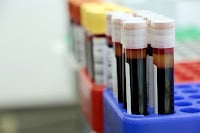A population study published today in the Journal of the American College of Cardiology points to a...
Inflammation May Be Linked to Specific Depression Symptoms, Study Suggests

Systemic inflammation appears to be associated with some but not all symptoms of depression, according to a report in AJP in Advance.
The pooled cohort study by Philipp Frank, M.Sc., of University College London and colleagues found that in individuals with depression, inflammation was associated with such physical symptoms as changes in appetite, loss of energy and motivation, and sleep problems. “In contrast, we found strong evidence against an association with a number of exclusively emotional symptoms, including fearfulness, feeling bothered by things, hopelessness about the future, and feeling life had been a failure,” the researchers wrote.
The findings point to the importance of “a more targeted, symptom-focused approach to exploring the link between systemic inflammation and depression, particularly in anti-inflammatory drug trials,” they added.
The report was based on data from 15 independent population-based cohort studies from multiple countries that examined the relationship between inflammation and depressive symptoms in adults. The analysis included more than 56,000 people 18 years and older who had blood samples collected at the start of their respective studies and answered questions about 24 individual depressive symptoms across five domains: physical, emotional, cognitive, perception of self, and self-harm. The concentration of C-reactive protein (CRP) in the blood samples was assessed in all 15 studies, and three studies also measured interleukin-6 (IL-6).
The pooled analysis revealed that the prevalence of depressive symptoms in the sample ranged from 1.1% (suicidal ideation) to 21.5% (sleep problems). Higher concentrations of CRP were associated with an increased risk of experiencing four physical symptoms (changes in appetite, felt everything was an effort, loss of energy, and sleep problems) and one cognitive symptom (little interest in doing things), Frank and colleagues reported. The association between CRP and these physical and cognitive symptoms remained after controlling for a variety of factors that also contribute to inflammation, including age, chronic illness, and adverse child events. Higher levels of IL-6 were also associated with an increased risk of experiencing these physical and cognitive symptoms.
“Our results lend support to the sickness behavior theory, which posits that peripherally localized inflammatory activity can initiate a cascade of initially adaptive depressive-like symptoms in a subset of people,” Franks and colleagues wrote. “These include a lack of energy (lethargy), changes in appetite, sleepiness, reduced social exploration, and, at times, confusion.”
For related information, see the American Journal of Psychiatry editorial “Using the Power of a Giant Wisely: Confirming Inflammation in Depression.”
(Image: iStock/Oleg Elkov)
Don't miss out! To learn about newly posted articles in Psychiatric News, please sign up here.






